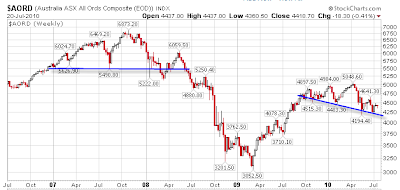Frugality the New Reality in Australia; Predatory Customers Addicted to Discounts
Courtesy of Mish
I have commented many times on US Consumer and Corporate Frugality but inquiring minds might be interested in happenings down under. Frugality has gone global.
Predatory Customers Addicted to Discounts
The Herald Sun reports Retailers could take years to recover because customers addicted to discounts.
A bargain frenzy since the global financial crisis has led consumers to expect and accept only slashed prices.
The dire forecast, from market research company TNS director Chris Kirby, comes as bored staff in some stores are put to work cleaning, tidying and changing window displays because of a lack of customers.
At some sites, especially fashion outlets, stock is discounted by up to 70 per cent as soon as it hits shelves to attract shopper interest.
"Consumers are no longer willing to accept the first price they find. They know there’s a good chance of finding it cheaper somewhere else," Mr Kirby said. "In essence the industry is training us to become professional, if not predatory, consumers."
The caution came as a Commonwealth Bank economic index that tracks credit and debit card transaction value trends across a wide range of industries reported the weakest spending since the height of the global financial crisis in early 2008.
Desperate Retailers Slashing Prices by 75 Percent
Please consider Retailers slashing prices by 75% as Queensland sales slow
One retail organisation, the United Retail Federation, said the slump was at its worst in Queensland, where small retailers were struggling to move stock, even after heavily discounting items.
The bleak picture is at odds with scenes of hundreds of shoppers queuing at lay-by counters to take advantage of major toy sales.
Thousands of bargain hunters queued at Big W stores for the start of its two-week toy sale, which ended last week.
One Gold Coast shopper complained of a four-hour wait at her local Big W store, and of being hit in the ankles with shopping trolleys in the stampede.
Target will follow with its toy sale from July 22 to August 4, having already released its 72-page catalogue offering 120 half-price bargains.
But Australian Retailers Association director Russell Zimmerman said retailers generally were finding it difficult to clear stock, even at hefty discounts. "It’s tough out there and retailers are finding it harder to move product at the moment than they have in the past," Mr Zimmerman said.
"They are offering 50, 60, and 70 per cent-off sales, which is unheard of. We are seeing that 20 per cent off isn’t enough to entice customers these days."
Consumers get the Jitters
Th Australian reports Economic jittes causing consumers to closely watch spending
Rising interest rates, a falling Australian dollar and economic gloom in Europe have overshadowed the fact that unemployment remains near record lows.
Department stores Myer and David Jones kicked off their winter clearance sales this week with discounts of up to 60 per cent.
But if consumer sentiment figures are anything to go by, they are going to have a tough time getting customers through the doors.
Over the past two months, the Westpac-Melbourne Institute consumer sentiment index has had its biggest fall since March 2008 and now sits at 101.9 points, just above the 100 level that denotes an equal number of optimistic and pessimistic survey responses.
Paradoxically, the release of the figures were followed by labour-force data showing unemployment fell last month to a 16-month low of 5.2 per cent.
Australian Retailers Association executive director Russell Zimmerman says that since then, things have become much worse.
"Some shopping centres in Sydney are seeing a 10 per cent decline in customer numbers; people don’t want to go to a shopping centre because they’re worried they’ll be tempted to spend money," he says.
Consumers are right to be concerned over interest rates: the average variable mortgage rate at 7.4 per cent in May compared with 5.75 per cent 12 months earlier, adds $95 a week to the payments on an average home loan of about $300,000.
RBA Expects Private Demand To Pick Up!
The Reserve Bank of Australia has finally managed to scare some sense into Australian consumers. Unfortunately it is far too late.
Australia’s property bubble is among the biggest worldwide, if indeed not the biggest. When the bubble pops and consumers toss in the towel, it’s lights out.
Thus, I have to laugh at the Minutes of the Monetary Policy Meeting of the Reserve Bank Board 6 July 2010
The domestic economy had been growing at a solid rate over the past year, including a sizeable contribution from fiscal spending. The economy was now entering a period in which private demand was expected to strengthen due to a pick-up in business investment flowing from the high level of the terms of trade. This was expected to offset the scaling back in public demand that would be taking place. There were tentative signs that this ‘hand over’ from public to private demand may be starting to occur, though this would warrant careful monitoring.
After a series of hikes to cool the property bubble and inflation, the RBA expects private demand to pick up? Really?!
Well it seems it did not and if history is any guide it won’t. This was likely the last hurrah for Australian consumers.
$AORD Australian Weekly Composite
click on chart to sharpen image
Lights Out
Technically, these head and shoulder patterns are appearing all over the place in foreign and domestic issues, across many timeframes. It does not portend anything good in my opinion.
Moreover, I doubt it matters if the RBA starts cutting rates somewhere down the line. Once consumers toss in the towel, it’s light out.
The global economy continues to weaken and few even notice. Everyone is busy cheering beat- the-street earnings that cannot and will not last.





